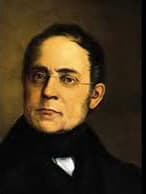
Carl Czerny
For every aspiring pianist, Carl Czerny is still a household name. His extensive sets of technical exercises are part of nearly every pianist’s training. Czerny was also the most famous student of Beethoven, and in turn a teacher of Liszt. His paternal grandfather was employed as a city official in Nymburk near Prague, and apparently he was a good amateur violinist. Wenzel Czerny, Carl’s father, was a pianist, organist, oboist and singer who received his education and musical training in a Benedictine monastery near Prague. After his marriage, Wenzel settled in Vienna in 1786 and made his living as a music teacher and piano repairman. Carl was born in the Viennese district of Leopoldstadt on 21 February 1791. He was baptized in the parish of St. Leopold, in the presence of the pianists Abbé Gelinek und Abbé Ferdinandi. Only a couple of months after Carl’s birth, Wenzel took his family to Poland as he had been appointed piano teacher to a local manor. Political unrest caused the parents to leave Poland earlier than intended, and they returned to Vienna with their four-year-old son Carl.
Carl Czerny: Variations on a Favourite Viennese Waltz by F. Schubert, Op. 12
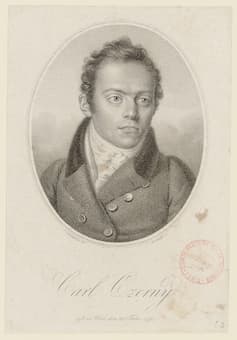
The young Carl Czerny
Carl was quickly identified as an extraordinary child prodigy, and he started to play piano at the age of three. He received his first lessons from his father, and writes in his autobiography, “Since my father had acquired a very good way of playing by studying Bach‘s, Clementi‘s and similar works […], this had a good influence on my diligence […] my father, far from wanting to train me to become a superficial concert player, rather, I tried to acquire a great deal of skill in sight-reading, and to develop my musical sense, by constantly studying new music.” Young Czerny was continually under parental supervision, and was “carefully isolated from other children.” It has been suggested that Wenzel Czerny was hardly the typical prodigy parent. An anecdote tells, “Beethoven once complained that the father was not strict enough, to which Wenzel replied, “Oh Mr. Beethoven, but he is our only child.” At any rate, Carl progressed rapidly and by the age of ten he was “able to play cleanly and fluently nearly everything of Mozart and Clementi.” Initially, he played piano recitals in his parent’s home, and made his first public appearance in 1800, performing Mozart’s Piano Concerto No. 24 in C minor.
Carl Czerny: Grand Sonata for Pianoforte and Violin in A Major (Erika Raum, violin; Anton Kuerti, piano)
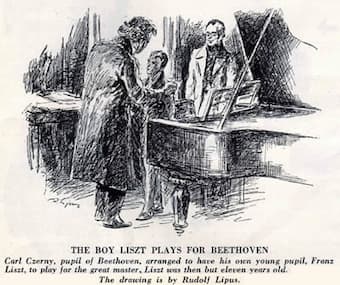
Czerny introduced his student Liszt to Beethoven
Carl was only eight years old when his father first introduced him to Beethoven. Subsequently, the Czech composer and violinist Wenzel Krumpholz arranged a visit to Beethoven’s home in 1801. Beethoven asked Czerny to play his Pathétique Sonata and Adelaide. Beethoven was impressed with the 10-year-old and accepted him as a student. Carl took lessons with Beethoven from 1801 to 1803 about twice a week, and sporadically until 1804. Czerny describes the lessons as “consisting of scales and technique at first, then progressing with the stress on legato technique throughout.” On Beethoven’s recommendations, Prince Lichnowsky engaged Carl at the age of 13 to play Beethoven compositions for him, “all of which Carl knew by memory insofar as they had already been composed.” Carl’s letters and autobiography are important documents describing Beethoven during this period. “Czerny was the first to report symptoms of Beethoven’s deafness, several years before the matter became public.” Of his first meeting with Beethoven, he wrote, “I also noticed with that visual quickness peculiar to children that he had cotton which seemed to have been steeped in a yellowish ointment, in his ears.”
Carl Czerny: Piano Concerto in D minor (Rosemary Tuck, piano; English Chamber Orchestra; Richard Bonynge, cond.)
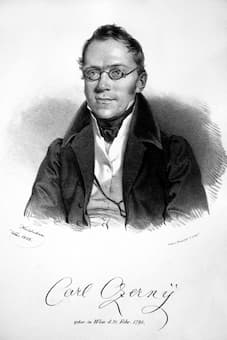
Czerny, 1833
Czerny highly admired Beethoven’s “facility at improvisation, his expertise at fingering, the rapidity of his scales and trills, and his restrained demeanour while performing.” In turn, Beethoven selected Czerny as pianist for the premiere of his Piano Concerto No. 1 in 1806 and, at the age of 21, in February 1812, Czerny gave the Vienna premiere of Beethoven’s Emperor Piano Concerto. Czerny produced his first compositions at the age of seven, and in 1802 he copied out many Bach fugues, Scarlatti sonatas “and other works by ancient composers.” In his early teens, he was deeply affected by Beethoven’s first two symphonies, and produced orchestral scores—which hadn’t been published yet—by copying the parts. He recalls, “Thus, very early on, I received a rather correct understanding of orchestration; and this work gave me such pleasure that I also made up scores for several Haydn and Mozart symphonies, which is in any case much more instructive for the student than just studying ready-made scores.” Czerny’s first published compositions appeared in 1806, and for the next 35 years, Czerny taught piano all day and composed all evening. His composition portfolio amounts to well over one thousand works.
For more of the best in classical music, sign up to our E-Newsletter
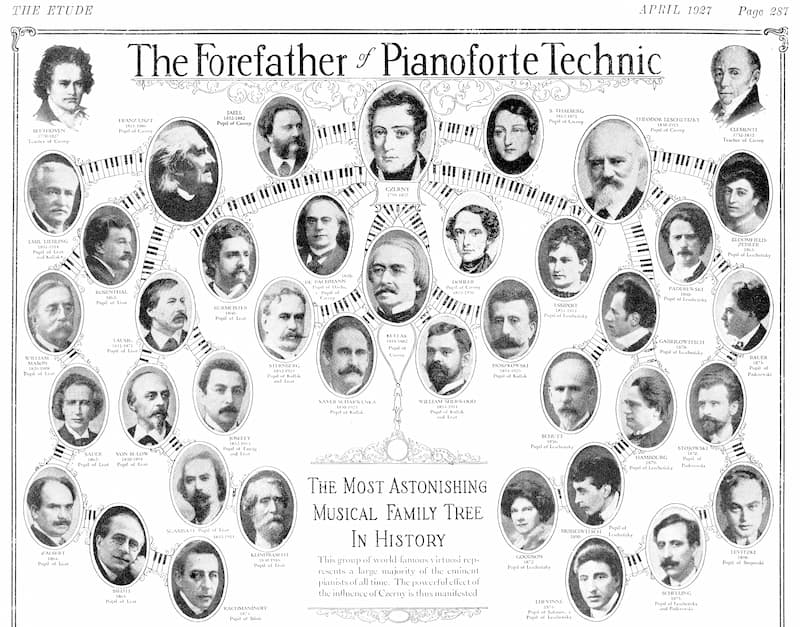
Czerny’s piano heritage tree
Carl Czerny: Quartet for four pianos

Great article on Czerny, finally some more information about him to enlighten us. He premiered a couple of Beethoven concertos,…taught Liszt,. He was an important figure in musical history
Thank you for the article.
Where can one get a copy of Czerny’s interpretation of Beethoven piano sonatas?
You can get it from any reputable bookseller (it would have to be ordered from Universal Edition. It’s also for sale on Amazon: https://www.amazon.com/Proper-Performance-Beethoven%C2%B4s-Works-Piano/dp/3702428372/ref=sr_1_3?crid=175A0YT7CQY1N&keywords=czerny+beethoven&qid=1676759712&sprefix=czerny+beethov%2Caps%2C280&sr=8-3